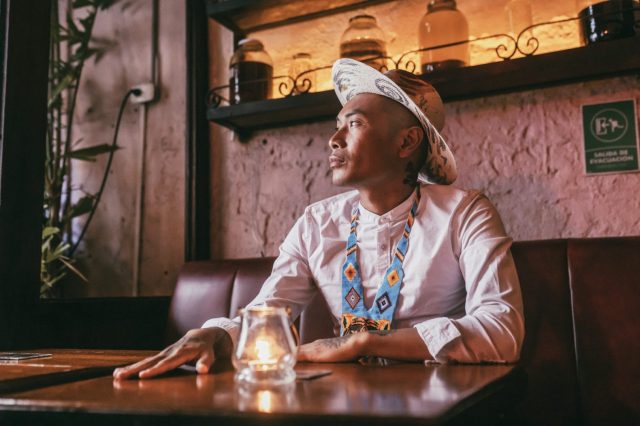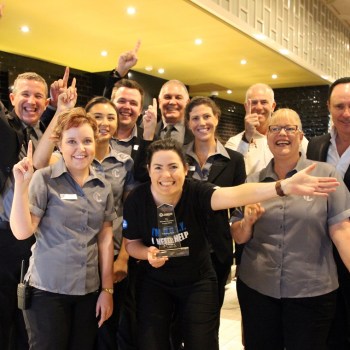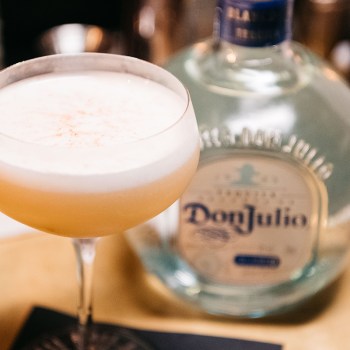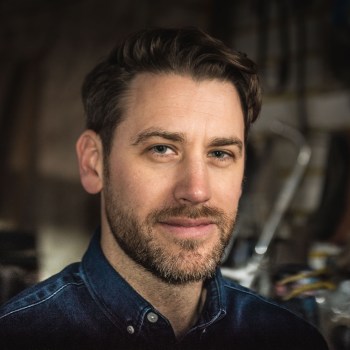Jean Trinh, who was last year voted the Altos Bartenders’ Bartender of the Year, explained why he doesn’t much care for individual awards, and gave his thoughts on the Australian hospitality landscape.
Jean, Co-founder of Colombian bar Alquímico, recalled the moment he learnt he had been awarded the prize.
“Mark Sansom from 50 Best called me to tell me: ‘You won this award, congratulations.’
“I said: ‘Brother, thank you very much, but I don’t like individual awards. I don’t represent everything, because there’s a huge team behind me.’”
In the end, Jean was convinced to accept the award after Mark explained how it would be good for his bar, good for the region and good for Colombian hospitality at large.
And Jean found a neat compromise to represent the country and his team at the prize ceremony.
“I imagined like: ‘Okay, let’s have a flag [of Colombia].’”
“And just before the ceremony, I talked to my guys in Barcelona, and I said: ‘When I tell you to, just turn around the flag,’ and there was a picture of the whole team, because I wanted to show that its not just me.
“I don’t like to be, let’s say, the character of these things.”
Bars & Clubs spoke to Jean following his address at the Maybe Masterclasses on Sunday 16 April, in which he explained how he steered his venue and its team through the chaos of the COVID-19 lockdowns.
With little government support, Alquímico and Jean found a handy workaround that allowed the team to remain employed, while also helping to sustainably produce ingredients, a major aspect of the bar’s concept and philosophy: they constructed accommodation at the bar’s 25-acre farm.
In his masterclass, Jean outlined how he pitched the idea to his team.
“We will start the farm together, we will live together and we will eat vegetables, because I don’t have money to buy meat anyway. And we won’t have internet, no TV.
“After one week, from the 55 people, 24 said yes, including two kids.”
Jean and his team were able to construct a house on the site within a couple of months, built an apiary and grew food together, donating some to those struggling during the pandemic. Through this process, he was able to keep his team together throughout the toughest period for the hospitality industry in many decades.
Reflections on Australian hospitality
As part of the Maybe Cocktail Festival, it was stipulated that touring bars visited venues outside of the Public Hospitality / Maybe Group stable. Bars & Clubs asked Jean what his perception of the Australian on-premise was.
“I was so surprised,” he said.
“The people are really smiley – I don’t see any violence, everything is clean. The other night I said: ‘Wow, this is the future.’
“If I were 20 years old and I came here – maybe I’d stay.”
Jean also hailed the organisation of the Maybe team, with particular reference to the Masterclass event.
“It’s really impressive, like this event for me, to see a line out on a Sunday morning at 10AM.”
His respect for the Maybe Team was part of the reason that Jean was first attracted to coming to Australia, alongside a desire to broaden his understanding of international hospitality.
“I like to travel and to have time to understand the new region. It’s my first time in Australia and I saw the [Maybe] guys like all around the world.”
Jean felt his brief meetings with the Maybe Group were not enough to really get a picture the Australian industry, and what the organisation was doing.
“If you go to a country, if you go to a city, you kind of understand. And the way everybody here respects what the guys of Maybe Sammy are doing. For me, it means a lot, the support they are giving to create this community.”
Hospitality philosophy
For Jean, there is a weight of responsibility to represent not only Colombia, but South American bartending as a whole.
“If we behave well, we don’t represent the bar, we represent the country, and a country so far away. It’s a responsibility. We have to be on time. We have to professional. And usually they expect from us from South America like craziness. We can have craziness if we are organised and at the bar. It’s not like magic, we have to be prepared, we double check everything before and that’s how we can give craziness, [but] organised.”
Jean also explained how a commitment to sustainability informs his approach to hospitality.
“Sustainability must not be the final objective. I think if you can just see what you can improve and see if you can do it organically – that’s the way,” he stated.
“When we won the award of Most Sustainable Bar in the World – that was not the goal, it was because of the story explained in the presentation [of the farm] and it was not the goal, it was more like ‘How can we survive this situation?’”
And ultimately, Jean’s demonstrated care for his team reflects not only his understanding of good hospitality, but his approach to life in general.
“For me, the most important thing is to take care of people. To make them feel present, and to give them something, because we have so much to share. If you don’t want to share, please, find another job. Because hospitality is about giving, not receiving,” Jean commented
And as for whether we’ll see Jean and Alquímico in Australia again – watch this space.
“The next step is coming back. It’s not if I want to come back… It’s when,” he concludes.
Alquímico held a residency at El Primo Sanchez on 15 April.



